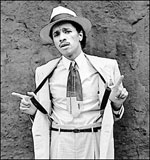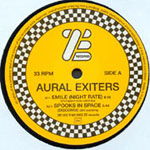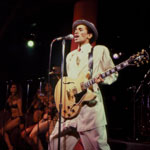
There most definitely are times when music needs to be visceral. The instinctive impulse, what Mark E Smith called “r’n’r as primal scream”. What the Jasmine Minks sang about as “getting back to basics, what’s wrong and right”. There are moments when we need possessed primitives like the Cramps, Panther Burns, Birthday Party, and The Jesus and Mary Chain.
I was fortunate. I saw The Jesus and Mary Chain three nights in a row in September 1984. They were something else. This was just before Bobby Gillespie took over on drums, playing standing up like he’d seen the Fire Engines do on TV. This was before anyone had worked out ploys like riots (you saw more violence in a school dinner queue – if you want to know about trouble at gigs check out the Rough Cut and Ready Dubbed DVD) and the powers that be fallen back in love with The Dark Stuff and the deeply dreary Nick Kent school of rock mythology.
The Mary Chain played the Rock Garden supporting Biff Bang Pow! and it was incredible. They looked awful, like pasty-faced Birthday Party neophytes, but sounded amazing. The amps seemed to be alive, and the guitars seemed to play themselves (I swear I didn’t see the brothers grim touch their strings), with feedback and melody creating a strange wall of noise, out of which occasionally a familiar refrain ('Vegetable Man', 'Love Battery', 'Ambition', 'Barracuda') would emerge. You couldn’t stop grinning.
The following evening, they were down at the Thames Poly in Woolwich, supporting Five Go Down To The Sea, and Jim had lost his voice so William took over on vocals, reading the words from a tatty notebook, but ultimately resorting to bellowing obscenities down on bended knees. And then on the Saturday, it was the last night at the Living Room, on the Tottenham Court Road, supporting the Mekons. And of course there was no stage there so we were just face to face with them, what we thought were the future, forming a thin line against a room full of people there for the headlining tired pub rock act that had once produced a couple of the greatest pop records ever.
And the next day the Mary Chain went into Alaska to record their debut single. In interviews soon after they would claim that they had been set up to react against the likes of Kid Creole and the Coconuts.

When groups like The Jesus and Mary Chain set themselves up in opposition to glossy pop acts, the name Kid Creole and the Coconuts was often thrown into the pot. The enduring image of August Darnell’s outfit from 1982/1983 is of hits everywhere ('Annie (I’m Not Your Daddy'), 'I’m A Wonderful Thing Baby', 'Stool Pigeon') and an arrogant showman prancing around in a zoot suit and spats, somehow extolling the virtues of upward mobility at any price. All of which is a little like taking Damon Runyan’s stories at face value.
We know how tame the Mary Chain turned out to be, but when you watch Downtown ’81 you see August Darnell in his Kid Creole putting on a hell of a show. And then you see James White and the Blacks (the Defunkt line-up) putting on a hell of a show. And then you start to work out why people like Orange Juice and Fire Engines became increasingly discontent with dusty pub back rooms, and wanted to offer something more.
August Darnell is one of the great pop figures, in stark contrast to his dreary detractors. Darnell was a teacher who became the lyricist for his brother’s group (Stoney Browder’s Dr Buzzard’s Original Savannah Band), helping to create a fantasy of a deeply dapper disco act that soaked up all the sounds of the Bronx and threw it all into the melting pot in the mid to late ‘70s to create a backdrop for a showbiz extravaganza that took Cab Calloway, Carmen Miranda, Duke Ellington, the Andrews Sisters, and yes Damon Runyon into the hippest disco, and emerged with some genuine hits and enduring classics ('I’ll Play The Fool', 'Sunshower', 'Hard Times', 'Cherchez La Femme' etc.) with the help of legends like Charlie Calello and Sandy Linzer of Laura Nyro, Toys, Odyssey etc fame.
Looking for outlets other than Dr Buzzard’s, August would work with the likes of Machine (for whom he created the immortal disco classic 'There But For The Grace Of God Go I') and Gichy Dan. Falling in with the emerging Ze-lightful set in New York provided an opening for Darnell’s Kid Creole and the Coconuts concept, throwing together a pan-rhythmic soundtrack with some slick and witty wordsmithery, some vintage Hollywood glamour, some sharp threads and smarter moves, and a batch of tunes to brighten the dullest day. But first Ze’s Zilkha had Darnell work up a set of songs for his girlfriend Cristina Monet, The ensuing set remains a marvel of the coquettish and kittenish, cute and catty and kitsch, with Cristina vamping it up like Marilyn Monroe in Studio 54. Between them Cristina and Darnell would also cook up the twisted take on 'Is That All There Is?' which would become legendary, and indeed Cristina outdid Darnell on her own Sleep It Off set, but that’s another story.
Ze also provided another outlet for Darnell’s ideas in the Aural Exciters, a side project for engineer Bob Blank who was at the controls for so many of the early Ze sessions. At one time or another the Aural Exciters featured anyone who was anyone within the New York punk/disco demi-monde, like Darnell, Savarese, James Chance, Pat Place, Lizzy Mercier Descloux, Taana Gardner, Coati Mundi, Ron Rogers. And formost among their recordings remains the exceptional 'Emile (Night Rate)', Darnell’s dubbed out downbeat disco classic which was years ahead of the Specials’ 'Ghost Town' and Massive Attack.

When the first Kid Creole and the Coconuts set, Off The Coast Of Me, appeared it was time for Ze to move out of the backwaters of Zigzag where Kris Needs had kept an early flame burning for records by Rosa Yemen, Marie et les Garcons, Mars, Teenage Jesus and Suicide. Now the NME and in particular Ian Penman was picking up on works by Cristina, Lydia Lunch, and Darnell, fitting in with a new anti-rock vision, wherein the song, the songwriter, the siren became all. And then over at The Face the Ze kaleidoscope of Kid Creole and James Chance/White seemed tailor made for its new club-oriented positioning.
The second Kid Creole set was musically more coherent, and Fresh Fruit in Foreign Places was conceived as the first rap musical though the group took to touring rather than working on Broadway. Concurrently longtime Darnell foil/fool Coati Mundi connected with the public via his incredible 'Que Pasa/me No Pop I' showstopper, one of the stranger hits of 1981 alongside Blondie’s 'Rapture', the Specials’ 'Ghost Town', the Tom Tom Club’s 'Wordy Rappinghood', Soft Cell’s 'Tainted Love', The Clash’s 'Magnificent Seven', The Teardrop Explodes’ 'Passionate Friend'. A good year for pop.
An early Dr Buzzard’s number ironically had been 'I’ll Play The Fool For You', which is sadly ironic where Darnell did just that as he danced his way to the top of the charts only to find his long time supporters had deserted him for whatever, and young brats like The Mary Chain were sneering in the wings, desperate for their fifteen minutes of fame.
Over time interest in the sounds and personalities of the downtown scene of the late ‘70s/early ‘80s meant a resurgence of interest in the likes of ESG and Arthur Russell, characters and visionaries who would have rubbed shoulders with Darnell back then. Indeed the Arthur Russell 'Wax The Van' number was recorded at Blank Studios, and was produced by Bob and Lola Blank in just the same way as many of Darnell’s moments of greatness.
Fortunately Darnell and all his possibilities were preserved in an amazing piece of journalism by the great observer Carol Cooper in a piece for Village Voice in July 1982. It’s the only piece of pop writing where I’ve seen the word chthonic used, and I suspect it would have made Darnell delighted. It sure makes a pleasant change from the Mary Chain yelping four letter words down a microphone.
By the way, Carol wrote: “Darnell is possessed of an extremely chthonic imagination and is wholly intent on snatching the mask off anything that passes for respectability. The only ‘themes’ Darnell has ever worked with are paradox and bathos, to focus attention on mankind’s original irreconciliables: spirit and flesh, emotion and intellect. These like the best of Darnell’s music, transcend sex, race, and class”.
© 2006 John Carney